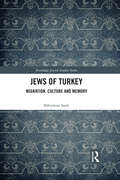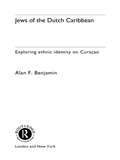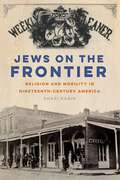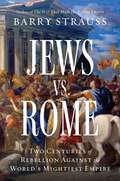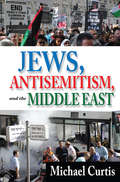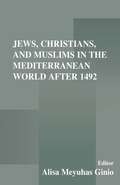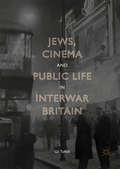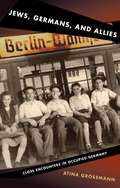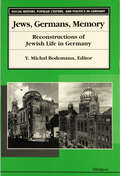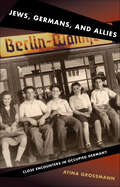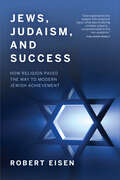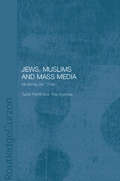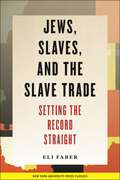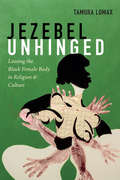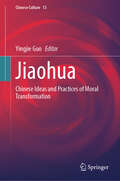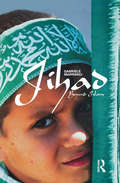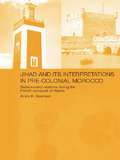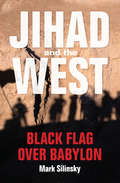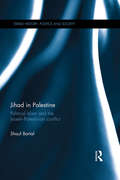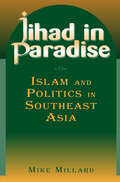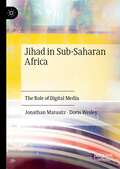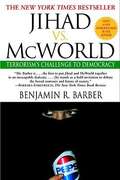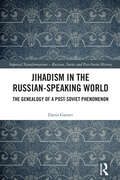- Table View
- List View
Jews of Turkey: Migration, Culture and Memory (Routledge Jewish Studies Series)
by Süleyman ŞanlıJews of Turkey: Migration, Culture and Memory explores the culture of Jews who immigrated from East Turkey to Israel. The study reveals the cultural values of their communities, way of life, beliefs and traditions in the multicultural and multi-religious environment that was the East of Turkey. <p><p>The book presents their immigration processes, social relationships, and memories of their past from a cultural perspective. Consequently, this study reconstructs the life of Eastern Jews of Turkey before their immigration to Israel. The anthropological fieldwork for this research was carried out over a year in Israel. The author visited eleven cities, where he found Jewish communities from the Ottoman Empire. The book examines their history and origins, personal stories of their immigration, and different social aspects, such as their relationships with Muslims, other Jewish neighbourhoods, the family, childhood, status of women, marriages, clothing, cuisine, religious life, education, economic conditions, Shabbat and holidays. <p><p>This is the first book that discusses multiple Jewish communities living in Israel who moved from East Turkey. The book will be a valuable resource for researchers and students who are interested in Jewish and Israeli studies, Turkish minorities and anthropology. <p><p>Süleyman Şanlı is the chair of the anthropology department at Mardin Artuklu University, Turkey. He was a visiting scholar at the Moshe Dayan Center at Tel Aviv University, where he conducted the anthropological fieldwork on Jews who migrated to Israel from Turkey. His research interests are, Ottoman Jews, Jews of Turkey, Jewish cultural studies and social and cultural anthropology.
Jews of the Dutch Caribbean: Exploring Ethnic Identity on Curacao
by Alan F. BenjaminJews of the Dutch Caribbean addresses identity and ethnicity, through a detailed study of a little-known group in Curacao, Netherlands Antilles. It asks readers to take a broad perspective on the contexts that play a role in ethnicity including, for example, ecology, history, kinship, commerce and language use in everyday life and, crucially, rituals. It asks readers to take a broad perspective on the contexts that play a role in ethnicity and draws on ethnographic research to analyze ethnic identities and look at how it is shaped and negotiated.
Jews on the Frontier: Religion and Mobility in Nineteenth-Century America (North American Religions)
by Shari RabinNational Jewish Book Award Winner: An &“enlightening&” history of how Jews forged their own religious culture as they ventured into the American wilderness (Choice).Finalist, 2017 Sami Rohr Prize for Jewish Literature, presented by the Jewish Book CouncilJews on the Frontier offers a religious history that begins in an unexpected place: on the road. Shari Rabin recounts the journey of Jewish people as they left Eastern cities and ventured into the American West and South during the nineteenth century. It brings to life the successes and obstacles of these travels, from the unprecedented economic opportunities to the anonymity and loneliness that complicated the many legal obligations of traditional Jewish life. Without government-supported communities or reliable authorities, where could one procure kosher meat? Alone in the American wilderness, how could one find nine co-religionists for a minyan (prayer quorum)? Without identity documents, how could one really know that someone was Jewish? Rabin argues that Jewish mobility during this time was pivotal to the development of American Judaism. In the absence of key institutions like synagogues or charitable organizations which had played such a pivotal role in assimilating East Coast immigrants, ordinary Jews on the frontier created religious life from scratch, expanding and transforming Jewish thought and practice.Jews on the Frontier vividly recounts the story of a neglected era in American Jewish history, offering a new interpretation of American religions, rooted not in congregations or denominations but in the politics and experiences of being on the move. This book shows that by focusing on everyday people, we gain a more complete view of how American religion has taken shape. This book follows a group of dynamic and diverse individuals as they searched for resources for stability, certainty, and identity in a nation where there was little to be found. &“Scholars of immigration have toiled for years on the question of how mobility affects nationalities and group identities alike…Rabin gives this framework an interesting twist by investigating mobility&’s influence on religion.&” ― American Jewish Archives Journal
Jews vs. Rome: Two Centuries of Rebellion Against the World's Mightiest Empire
by Barry StraussA new history of two centuries of Jewish revolts against the Roman Empire, drawing on recent archeological discoveries and new scholarship by leading historian Barry Strauss.Jews vs. Rome is a gripping account of one of the most momentous eras in human history: the two hundred years of ancient Israel&’s battles against Rome that reshaped Judaism and gave rise to Christianity. Barry Strauss vividly captures the drama of this era, highlighting the courageous yet tragic uprisings, the geopolitical clash between the empires of Rome and Persia, and the internal conflicts among Jews. Between 63 BCE and 136 CE, the Jewish people launched several revolts driven by deep-seated religious beliefs and resentment towards Roman rule. Judea, a province on Rome&’s eastern fringe, became a focal point of tension and rebellion. Jews vs. Rome recounts the three major uprisings: the Great Revolt of 66–70 CE, which led to the destruction of Jerusalem and the Temple, culminating in the Siege of Masada, where defenders chose mass suicide over surrender; the Diaspora Revolt, ignited by heavy taxes across the Empire; and the Bar Kokhba Revolt. We meet pivotal figures such as Simon Bar Kokhba but also some of those lesser-known women of the era like Berenice, a Jewish princess who played a major role in the politics of the Great Revolt and was improbably the love of Titus—Rome&’s future emperor and the man who destroyed Jerusalem and the Temple. Today, echoes of those battles resonate as the Jewish nation faces new challenges and conflicts. Jews vs. Rome offers a captivating narrative that connects the past with the present, appealing to anyone interested in Rome, Jewish history, or the compelling true tales of resilience and resistance.
Jews, Antisemitism, and the Middle East
by Michael CurtisWill animosity towards Jews and the State of Israel never end? This book ventures to rectify the misrepresentations, propaganda, obsessions, and falsifications widely disseminated in the media and public discourse, explaining the motivations behind them. The issues Michael Curtis scrutinizes are complicated and controversial, sometimes even baffling, but he reviews them in as objective and rigorous a manner as possible. Curtis divides his arguments into five key areas: political correctness and the obsessive attack on Israel; the surprising and disturbing rise of antisemitism; the Arab world and the Islamist threat; the Palestinian narrative; and the Israeli/Palestinian conflict. The first section focuses on the censorious attitude toward Israel taken by many in the international community. A second section consists of essays on the increase of contemporary antisemitism in Arab and Muslim countries as well as European democracies. In the third section, the author addresses changes in the Arab world, the threat of Iranian ambitions, the new alliance of Sunni Islamist states, and the growing strength and danger of Islamic fundamentalism and extremist behavior. His fourth section, on the Palestinian Narrative, details the acceptance by many critics of Israel and the international media of the Palestinian narrative of victimhood. Finally, the section on the Israeli-Palestinian conflict details the continuing struggle within the Middle East between Israelis and Palestinians. This book is a must read for historians, political scientists, Jewish studies scholars, and all those interested in one of the most volatile and controversial regions in the world today.
Jews, Christians, and Muslims in the Mediterranean World After 1492
by Alisa Meyuhas GinioThe expulsion of the Jews, and later the Muslims from the Iberian Peninsula marked the beginning of a new era in the life of the Mediterranean world. The articles in this volume discuss the aftermath of the crucial historical events that took place in the Mediterranean world in 1492, focusing on the social, economic and cultural consequences of these occurrences.
Jews, Cinema and Public Life in Interwar Britain
by Gil ToffellThis book investigates a Jewish orientation to film culture in interwar Britain. It explores how pleasure, politics and communal solidarity intermingled in the cinemas of Jewish neighbourhoods, and how film was seen as a vessel through which Jewish communal concerns might be carried to a wider public. Addressing an array of related topics, this volume examines the lived expressive cultures of cinemas in Jewish areas and the ethnically specific films consumed within these sites; the reception of film stars as representations of a Jewish social body; and how an antisemitic canard that understood the cinema as a Jewish monopoly complicated its use as a base for anti-fascist activity. In shedding light on an unexplored aspect of British film reception and exhibition, Toffell provides a unique insight into the making of the modern city by migrant communities. The title will be of use to anyone interested in Britain’s interwar leisure landscape, the Jewish presence in modernity, and a cinema studies sensitised to the everyday experience of audiences.
Jews, Germans and Allies: Close Encounters in Occupied Germany
by Atina GrossmannIn the immediate aftermath of World War II, more than a quarter million Jewish survivors of the Holocaust lived among their defeated persecutors in the chaotic society of Allied-occupied Germany. Jews, Germans, and Allies draws upon the wealth of diary and memoir literature by the people who lived through postwar reconstruction to trace the conflicting ways Jews and Germans defined their own victimization and survival, comprehended the trauma of war and genocide, and struggled to rebuild their lives. In gripping and unforgettable detail, Atina Grossmann describes Berlin in the days following Germany's surrender--the mass rape of German women by the Red Army, the liberated slave laborers and homecoming soldiers, returning political exiles, Jews emerging from hiding, and ethnic German refugees fleeing the East. She chronicles the hunger, disease, and homelessness, the fraternization with Allied occupiers, and the complexities of navigating a world where the commonplace mingled with the horrific. Grossmann untangles the stories of Jewish survivors inside and outside the displaced-persons camps of the American zone as they built families and reconstructed identities while awaiting emigration to Palestine or the United States. She examines how Germans and Jews interacted and competed for Allied favor, benefits, and victim status, and how they sought to restore normality--in work, in their relationships, and in their everyday encounters. Jews, Germans, and Allies shows how Jews were integral participants in postwar Germany and bridges the divide that still exists today between German history and Jewish studies.
Jews, Germans, Memory: Reconstructions of Jewish Life in Germany (Social History, Popular Culture, And Politics In Germany)
by Y. Michal BodemannHow was it possible that a new and sizeable Jewish community developed after the Holocaust in Germany of all places? Jews, Germans, Memory undertakes to assess the past, present, and future of German-Jewish relations in the light of recent political changes and the opening up of historical resources. This welcome new volume investigates how the groundwork was laid for the new Jewish community in the post-war period, with different objectives by Jewish leaders and German politicians. Its contributors touch upon history, literature, the media, ethnicity, politics, and social movements, and attempt to answer the question of how Jews are socially constructed and how the glorious German Jewish past and the Holocaust have been remembered in the course of recent decades. In recent years, German Jewry has seen fundamental transformations with the influx from Eastern Europe and a new leadership in the community. A new self-definition, even self-assurance and reappraisal in Israel and elsewhere, has evolved. Historians, scholars of cultural studies, and those interested in debates on memory and ethnicity will all find something of interest in this diverse volume. Jews, Germans, Memory joins in debate Michael Brenner, Micha Brumlik, Dan Diner, Cilly Kugelmann, and Martin Löw-Beer, among the most prominent younger Jewish intellectuals in Germany today, with others who have long observed Germany from both inside and outside: Y. Michal Bodemann, John Borneman, Andrei Markovits, Robin Ostrow, Moishe Postone, Frank Stern, and Jack Zipes. Y. Michal Bodemann is Professor of Sociology, University of Toronto.
Jews, Germans, and Allies: Close Encounters in Occupied Germany
by Atina GrossmannIn the immediate aftermath of World War II, more than a quarter million Jewish survivors of the Holocaust lived among their defeated persecutors in the chaotic society of Allied-occupied Germany. Jews, Germans, and Allies draws upon the wealth of diary and memoir literature by the people who lived through postwar reconstruction to trace the conflicting ways Jews and Germans defined their own victimization and survival, comprehended the trauma of war and genocide, and struggled to rebuild their lives. In gripping and unforgettable detail, Atina Grossmann describes Berlin in the days following Germany's surrender--the mass rape of German women by the Red Army, the liberated slave laborers and homecoming soldiers, returning political exiles, Jews emerging from hiding, and ethnic German refugees fleeing the East. She chronicles the hunger, disease, and homelessness, the fraternization with Allied occupiers, and the complexities of navigating a world where the commonplace mingled with the horrific. Grossmann untangles the stories of Jewish survivors inside and outside the displaced-persons camps of the American zone as they built families and reconstructed identities while awaiting emigration to Palestine or the United States. She examines how Germans and Jews interacted and competed for Allied favor, benefits, and victim status, and how they sought to restore normality--in work, in their relationships, and in their everyday encounters.Jews, Germans, and Allies shows how Jews were integral participants in postwar Germany and bridges the divide that still exists today between German history and Jewish studies.
Jews, Judaism, and Success: How Religion Paved the Way to Modern Jewish Achievement
by Robert EisenIn Jews, Judaism, and Success, Robert Eisen attempts to solve a long-standing mystery that has fascinated many: How did Jews become such a remarkably successful minority in the modern Western world? Eisen argues that Jews achieved such success because they were unusually well-prepared for it by their religion – in particular, Rabbinic Judaism, or the Judaism of the rabbis. Rooted in the Talmud, this form of Judaism instilled in Jews key values that paved the way for success in modern Western society: autonomy, freedom of thought, worldliness, and education. The book carefully analyses the evolution of these four values over the past two thousand years in order to demonstrate that they had a longer and richer history in Jewish culture than in Western culture. The book thus disputes the common assumption that Rabbinic Judaism was always an obstacle to Jews becoming modernized. It demonstrates that while modern Jews rejected aspects of Rabbinic Judaism, they also retained some of its values, and these values in particular led to Jewish success. Written for a broad range of readers, Jews, Judaism, and Success provides unique insights on the meaning of success and how it is achieved in the modern world.
Jews, Muslims and Mass Media: Mediating the 'Other' (Routledge Jewish Studies Series)
by Tudor Parfitt Yulia EgorovaThis text looks at the ways in which Jews, Muslims and the conflict between them has been covered in the modern media. Both Jews and Muslims generally receive a 'bad press'. This book will try to reveal why. The media have clearly played a pro-active role in the Middle East conflict, the coverage of which is obscured by the contrasting images of Jew and Muslim in western thought.
Jews, Slaves, and the Slave Trade: Setting the Record Straight (New Perspectives on Jewish Studies #6)
by Eli FaberLays to rest the controversial myth of Jewish involvement in the slave tradeIn the wake of the civil rights movement, a great divide opened up between African American and Jewish communities. What was historically a harmonious and supportive relationship suffered from a powerful and oft-repeated legend, that Jews controlled and masterminded the slave trade and owned slaves on a large scale, well in excess of their own proportion in the population.In this groundbreaking book, likely to stand as the definitive word on the subject, Eli Faber cuts through this cloud of mystification to recapture an important chapter in both Jewish and African diasporic history.Focusing on the British empire, Faber assesses the extent to which Jews participated in the institution of slavery through investment in slave trading companies, ownership of slave ships, commercial activity as merchants who sold slaves upon their arrival from Africa, and direct ownership of slaves. His unprecedented original research utilizes shipping and tax records, stock-transfer ledgers, censuses, slave registers, and synagogue records. These materials reveal, once and for all, the minimal nature of Jews' involvement in the subjugation of Africans in the Americas.A crucial corrective, Jews, Slaves, and the Slave Trade lays to rest one of the most contested historical controversies of our time.
Jews, Sports, and the Rites of Citizenship
by Jeffrey S. Gurock John Hoberman Edward Shapiro Joshua Shanes Jack Jacobs Tamir Sorek Anat Helman Jack Kugelmass Stephen J Whitfield Harvey E Goldberg Andre LevyTo many, an association between Jews and sports seems almost oxymoronic--yet Jews have been prominent in boxing, basketball, and fencing, and some would argue that hurler Sandy Koufax is America's greatest athlete ever. In Jews, Sports, and the Rites of Citizenship, Jack Kugelmass shows that sports--significant in constructing nations and in determining their degree of exclusivity--also figures prominently in the Jewish imaginary. This interdisciplinary collection brings together the perspectives of anthropologists and historians to provide both methodological and regional comparative frameworks for exploring the meaning of sports for a minority population.
Jezebel Unhinged: Loosing the Black Female Body in Religion and Culture
by Tamura LomaxIn Jezebel Unhinged Tamura Lomax traces the use of the jezebel trope in the black church and in black popular culture, showing how it is pivotal to reinforcing men's cultural and institutional power to discipline and define black girlhood and womanhood. Drawing on writing by medieval thinkers and travelers, Enlightenment theories of race, the commodification of women's bodies under slavery, and the work of Tyler Perry and Bishop T. D. Jakes, Lomax shows how black women are written into religious and cultural history as sites of sexual deviation. She identifies a contemporary black church culture where figures such as Jakes use the jezebel stereotype to suggest a divine approval of the “lady” while condemning girls and women seen as "hos." The stereotype preserves gender hierarchy, black patriarchy, and heteronormativity in black communities, cultures, and institutions. In response, black women and girls resist, appropriate, and play with the stereotype's meanings. Healing the black church, Lomax contends, will require ceaseless refusal of the idea that sin resides in black women's bodies, thus disentangling black women and girls from the jezebel narrative's oppressive yoke.
Jiaohua: Chinese Ideas and Practices of Moral Transformation (Chinese Culture #13)
by Yingjie GuoChapters &“Jiaohua through Humanistic Buddhism: Integrating Transcendence with Worldly Matters&” and "Jiaohua through Humanistic Buddhism: Integrating Transcendence with Worldly Matters" are available open access under a Creative Commons Attribution 4.0 International License via link.springer.com.
Jihad Beyond Islam
by Gabriele MarranciJihad' is a highly charged word. Often mistranslated as 'Holy War', it has become synonymous with terrorism. Current political events have entirely failed to take account of the subtlety and complexity of jihad. Like many concepts with a long history, different cultural ideas have influenced the religious aspects of jihad. As a result its original meaning has been adapted, modified and destabilized - never more than at the present time. How does jihad manifest itself in Muslims' everyday lives? What impact has 9/11 and its backlash had on jihad? By observing the current crisis of identity among ordinary Muslims, this timely book explores why, and in what circumstances Muslims speak of jihad. In the end, jihad is what Muslims say it is. Marranci offers us a nuanced and sophisticated anthropological understanding of Muslims' lives far beyond the predictable cliches.A PDF version of this book is available for free in open access via the OAPEN Library platform, www.oapen.org
Jihad and Genocide (Studies In Genocide: Religion, History, And Human Rights Ser. #1)
by Richard L RubensteinA study of Islamic fundamentalism, its violent and deadly history, and the questions it raises today. This book examines the relationship between jihad and genocide, past and present. Richard L. Rubenstein takes a close look at the violent interpretations of jihad and how they have played out in the past hundred years, from the Armenian genocide through current threats to Israel. Rubenstein&’s unflinching study of the potential for fundamentalist jihad to initiate targeted violence raises pressing questions in a time when questions of religious co-existence, particularly in the Middle East, are discussed urgently each day. Praise for Jihad and Genocide&“Provocative, important reading for all interested in Arab-Israeli peace and religious coexistence worldwide. Highly recommended.&” —Choice Reviews&“Rubenstein&’s analysis stands the test of time. Thus, attention must be paid to Rubenstein's new work, Jihad and Genocide, which offers a searing analysis of Islamic thought and bleak predictions of its impact. Even those of us who do not share his pessimism, his sense of the inevitability of the path to genocide and war, or his predilection for the political right, must confront the issues he raises.&” —Foreword Reviews
Jihad and its Interpretation in Pre-Colonial Morocco: State-Society Relations during the French Conquest of Algeria
by Amira K. BennisonThis book investigates the importance of waging jihad for legitimacy in pre-colonial Morocco. It counters colonial interpretations of the pre-colonial Moroccan sultanate as hopelessly divided into territories of 'obedience' and 'dissidence' by suggesting that state-society warfare was one aspect of a constant process of political negotiation. Detailed analysis of state and society interpretations of jihad during the critical period of the French conquest of Algeria clearly shows this process at play and its steady evolution in the context of increasing European pressure, which culminated in the imposition of the French protectorate in 1912.
Jihad and the West: Black Flag over Babylon (Encounters: Explorations in Folklore and Ethnomusicology)
by Mark Silinsky&“Expertly weaves the story of the current conflict through the points of view of perpetrators, victims, and nations.&”—Journal of Military History U.S. Department of Defense analyst Mark Silinsky reveals the origins of the Islamic State&’s obsession with the Western world. Once considered a minor irritant in the international system, the Caliphate is now a dynamic and significant actor on the world&’s stage, boasting more than 30,000 foreign fighters from eighty-six countries. Recruits consist not only of Middle-Eastern-born citizens, but also a staggering number of &“Blue-Eyed Jihadists,&” Westerners who leave their country to join the radical sect. Silinsky provides a detailed and chilling explanation of the appeal of the Islamic State and how those abroad become radicalized, while also analyzing the historical origins, inner workings, and horrific toll of the Caliphate. By documenting the true stories of men, women, and children whose lives have been destroyed by the radical group, Jihad and the West presents the human face of the thousands who have been abducted, raped, tortured, and murdered by the Islamic State, including Kayla Mueller, who was kidnapped, given to the Caliphate&’s leader as a sex slave, and ultimately killed.
Jihad in Palestine: Political Islam and the Israeli-Palestinian Conflict (Israeli History, Politics and Society)
by Shaul BartalThe 21st century exists in the shadow of the return of extremist Islam to the center of the world’s political stage, a process that began at the end of the previous century. While researchers have focused on the rise of Hamas, this return has in fact manifested itself in a range of independent Islamic extremist groups with their own philosophies. Jihad in Palestine provides a comprehensive study of the variety of Islamic extremist groups operating inside Israel/Palestine today, examining their philosophies and views concerning martyrdom, as well as their attitudes to the Israeli-Palestinian conflict. These ideologies are presented in their own words, thanks to the author’s extensive translations and commentary of primary sources in Arabic, including the writings of the Islamic Jihad, al-Jama’a al-Islamiya, Hizbal-Tahrir al-Islami, Hamas and the Islamic Movement. The book studies the attitudes of these organisations towards the fundamental issues surrounding Jihad, including the concept of personal obligation, the relationship of the movement to the peace agreements and attitudes towards Jews expressed in the movement’s writings. Exploring the basic theories of sacrifice and analysing modern day Palestinian society, it promotes a greater understanding of the religious angle of the Israeli-Palestinian conflict. The book will be of interest to students and scholars of Middle East Studies, Jewish Studies, Political Islam and Terrorism & Political Violence.
Jihad in Paradise: Islam and Politics in Southeast Asia
by Mike MillardWritten in an accessible, journalistic style, Jihad in Paradise focuses on Southeast Asia's struggle to deal with Islamic extremists and terrorism at the hands of Jemah Islamiyah, al Qaeda's Southeast Asian arm. Although the book gives particular attention to Singapore's attempts to deal with these issues, the story extends into Malaysia, Indonesia, and the Philippines. All of these countries have significant Muslim populations, and recent violent events have affected the business environment, tourism, and the region's tradition of religious tolerance. The author draws on personal interviews with experts in the field as well as key political and religious figures in Singapore, Malaysia, and Indonesia, including Prime Minister Lee Kuan Yew, Minister for Muslim Affairs Jaacoub Ibrahim, and expelled Muslim dissident Zulfikar Mohamad Sharif. Millard examines the Bali bombing, Malaysia's conservative Islamic party PAS, the Malaysian province of Kelantan which is a Muslim political hotbed, Abu Saayaf of the Philippines, and Fateha.com and the use of the Internet. He also provides a glimpse of how Singapore, the region's most developed nation, has engineered its society in order to impose a degree of racial and religious tolerance.
Jihad in Sub-Saharan Africa: The Role of Digital Media
by Jonathan Matusitz Doris WesleyThis book examines how jihadist groups in sub-Saharan Africa have managed to advance their extremist agenda and recruit new followers thanks to digital media fueled by the information revolution since the dawn of the 21st century. This examination is based on a mixture of historical accounts, contemporary descriptions, case studies, theoretical applications, and an in-depth applied study (in the late chapters of the manuscript). An important conclusion is that the progress of jihadism in sub-Saharan Africa has been commensurate with the development and availability of digital media. This book breaks new ground in three ways. It is the first major academic work to devote most of its content exclusively to the use of digital media by jihadist groups in that region. Examples of jihadist digital media include social networking sites, online instructional videos, propaganda videos, and online jihadist magazines―among others. Secondly, it provides detailed case studies of both well-knownAfrican groups (e.g., Al-Shabaab, Boko Haram) and lesser-known ones― e.g., the Allied Democratic Forces in the Congo (which have, nevertheless, wreaked so much damage). Lastly, it is the first book to include an in-depth thematic analysis of online jihadist magazines―Inspire, Dabiq, Rumiyah, and Gaidi Mtaani―on their content dedicated to sub-Saharan Africa.
Jihad vs. McWorld
by Benjamin R. BarberJIHAD VS. MCWORLD is an essential text for anyone who wants to understand the challenges facing us after the tragic events of September 11, 2001 and in light of the current conflict in the Middle East. In a groundbreaking work, political scientist Benjamin R. Barber offers a penetrating analysis of the central conflict of our times: consumerist capitalism versus religious and tribal fundamentalism. These diametrically opposed but intertwined forces are tearing apart - and bringing together - the world as we know it, undermining democracy and the nation-state on which it depends. On the one hand, capitalism on the global level is rapidly dissolving the social and economic barriers between nations, transforming the world's diverse populations into a blandly uniform market. On the other hand, ethnic, religious, and racial hatreds are fragmenting the political landscape into smaller and smaller tribal units. JIHAD VS. MCWORLD is the term that Barber has coined to describe the powerful and paradoxical interdependence of these forces. In this important book, now more timely than ever before, he explores the alarming repercussions of this potent dialectic and in his new introduction sketches a democratic response to terrorism.
Jihadism in the Russian-Speaking World: The Genealogy of a Post-Soviet Phenomenon (Imperial Transformations – Russian, Soviet and Post-Soviet History)
by Danis GaraevThis book contends that the discourses of jihadism in Russia's North Caucasus, and their offshoots in other parts of the Russian Federation, are not just reflections of jihadi ideologies that came from abroad, rather that post-Soviet jihadism is a phenomenon best understood when placed in the broader cultural environment in which it emerged, an environment which comprises the North Caucasus, the whole of Russia, and beyond. It examines how post-Soviet jihadism is also part of global processes, in this case, global jihadism, explores how post-Soviet jihadism bears the imprint of the preceding Soviet context especially in terms of symbols, discursive tools, interpretational frameworks, and dissemination strategies, and discusses how, ironically, Russian-speaking jihadism is an expansionist idea for uniting all Russian regions on a supra-ethnic principle, but an idea that was not born in Moscow or St. Petersburg. Overall, the book demonstrates that Russian-speaking jihadism is a completely new ideology, which nevertheless has its origins in the intellectual and cultural heritage of the Soviet era and in the broader trends of post-Soviet society and culture.
